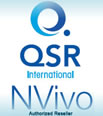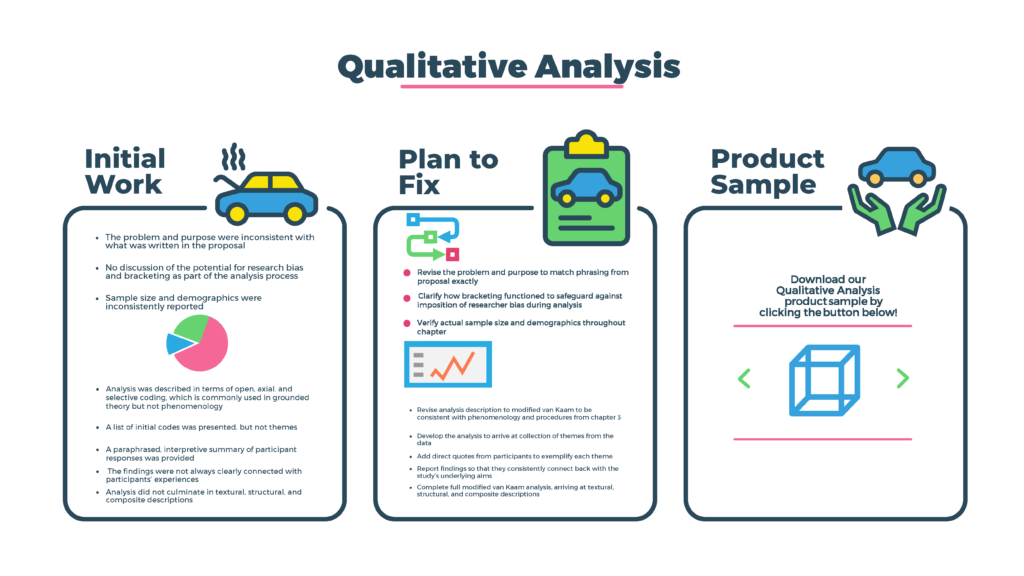- Academic Research and Dissertation Consulting
- Overview
- Course Work Assistance
- Comprehensive Exams
- Topic Development
- Prospectus and Concept Paper
- Introduction
- Literature Review
- Systematic Literature Review
- Qualitative Methodology
- Quantitative Methodology
- Power Analysis
- IRB
- Transcription
- Qualitative Aanalysis
- Statistical-Analysis
- Discussion Section
- Dissertation Defense
- Virtual Tutoring and Coaching
- Thesis Consulting
- Journal Article Assistance
- Medium Article Assistance
As full service dissertation consultants, our expertise with multiple analysis protocols and platforms allows us to help you deliver robust results

QUALITATIVE ANALYSIS
Expertise with the requirements of all major online universities
Comprehensive support with qualitative research
Revisions and assistance until approval
While QandQ started out as a statistical analysis firm, since then we’ve expanded to provide the most comprehensive qualitative research support available for doctoral candidates and established academic researchers alike. We are the only firm to provide comprehensive assistance with qualitative methodology development, data analysis, and drafting results. This means that, if you’re seeking any support to perform your qualitative analysis and interpret your results, we are uniquely qualified to assist you–regardless of your specific research design.
There are 3 ways to initiate contact with us:
- Please review and submit the following form. Someone from our team will contact you within 1 hour (during business hours), or at your requested time.
- Alternatively, our consulting team is available via telephone Monday through Friday from 8:00 A.M. to 8:00 P.M Eastern Time (5:00 A.M. to 5:00 P.M Pacific Time), and from 8:00 A.M. to 7:00 P.M. Eastern Time on Saturday (5:00 A.M. to 4:00 P.M Pacific Time). Feel free to call us
- We also pride ourselves on our very prompt and in-depth e-mail responses, 365 days per year. We normally answer all urgent queries very promptly, including late-night and weekend requests. You can email us at Info@qandqmanagemnet.co.uk
Please be prepared to discuss the specifics of your project, your timeline for assistance, and any other relevant information regarding your proposed consultation. We respect the confidentiality of your project and will, at your request, supply you with a Non-Disclosure Agreement before discussing specifics.
Our qualitative research experts are highly experienced with qualitative analysis software, including NVivo 11, ATLAS.ti, MAXQDA, and Dedoose. As qualitative research becomes more complex, with IRB documentation requirements, more participants, audio and video recording, data coding, and multiple levels of analysis, universities are encouraging students to use these software tools. As full service dissertation consultants, our expertise with these platforms allows us to help you with each stage of the analysis process so that your results are robust and provide clear insights into your research questions. We know that a clear analysis process and results discussion are the best way to get your completed research approved sooner!
QandQ Consulting has helped our clients comprehensively analyze their qualitative data utilizing a number of different methodologies. Some of the most frequent qualitative research and analysis methods are described below, though we are also well versed in hermeneutical studies, narrative analysis, quasi-statistics, and more. After more than 17 years providing dissertation assistance, we’re knowledgeable in virtually every qualitative research and analysis method!
- Phenomenology: The overall aim of phenomenology is to derive an understanding of essential meanings as perceived by participants, and constructed through interpretation of their lived experiences. This methodological approach necessitates in-depth interviews that usually last from 90 to 120 minutes. Typically for doctoral-level research, phenomenological studies also have a small number of participants. These can be as small as 6 to 10, but some doctoral candidates decide to interview up to 20 participants. This methodology is used to look for patterns and trends by identifying shared beliefs that have yet to be addressed by existing literature, so it is important to find dissertation consultants who understand the unique characteristics of a phenomenological study and shed any preconceived notions when engaging in appropriate qualitative analysis.
- Case studies: Case studies take a more holistic approach to qualitative research. They can be descriptive, exploratory, explanatory, so they are certainly one of the more versatile qualitative methodologies. The overall aim is to understand complex processes as they naturally occur within specified bounded systems or groups. For a single case study design, the aim is to explore participants’ experiences of complex phenomena in a single setting or group. For a multiple case study design, the aim is to compare experiences across different settings, such as different business environments or schools. A main consideration for data collection for case studies is triangulation. You need multiple data sources (such as interviews, written responses, observations, focus groups, and/or artifacts) to assess for degree of data convergence across sources–and to conduct a thorough thematic analysis to provide robust results for your research questions.
- Grounded theory: The overall aim of grounded theory is to construct a theoretical model that explains phenomena of interest, based on the direct experiences and perspectives of participants. Data collection involves interviews with participants who are selected using theoretical sampling, meaning they are deliberately chosen based on expectations of their abilities to “fill in” any gaps in understanding as you construct theory from the data. This design, in particular, involves an iterative process in which the researcher moves between data collection and data analysis, with insights gained through analysis phases then guiding the focus of future data collection. This iterative process then furthers the continued theoretical sampling process, as new participants are sought to elaborate more fully on as yet undeveloped components of the theory as these emerge through qualitative analysis.
- Ethnography: The overall aim of ethnographic research is to develop an in-depth understanding of complex social and/or cultural phenomena within specific settings or groups, through direct immersion in and interaction with the setting or group of interest. This is a fundamentally immersive form of qualitative research, in which the researcher’s own experiences, perspectives, and interpretations are central to the findings and conclusions of the study. Data collection must take place over an extended period of time to develop a full appreciation of the cultural complexities as they occur within the group of interest. This is often a combination of immersive approaches, such as participant and nonparticipant observation, as well as interviews, and review of archival documents, artifacts, or symbols that have relevance for the group of interest.
- General qualitative inquiry: If you don’t want to be constrained by a specific methodology, or if your design does not fully mesh with those described above, you can follow a general qualitative inquiry design. This design allows for greater flexibility in terms of sample size and data collection procedures, and can focus solely on interviews or use multiple forms of data to identify categories during the analysis process. Because we have experts in so many fields, we are well equipped to identify trends, themes, and patterns to classify data from many different disciplines. In addition, our expertise with NVivo, MAXQDA, ATLAS.ti, and Dedoose are special assets to anyone conducting content analysis, which involves a theory-driven quantification of traditionally qualitative research materials, such as audio, video, or transcribed data.

Let’s keep it a secret…
Before sharing your materials with us, we will send you our Non-Disclosure Agreement, which guarantees that your work materials, and even your identity as a client, will never be shared with a third party.
qualitative analysis projects completed last year
projects completed in our core research areas
qualitative analysis software options available